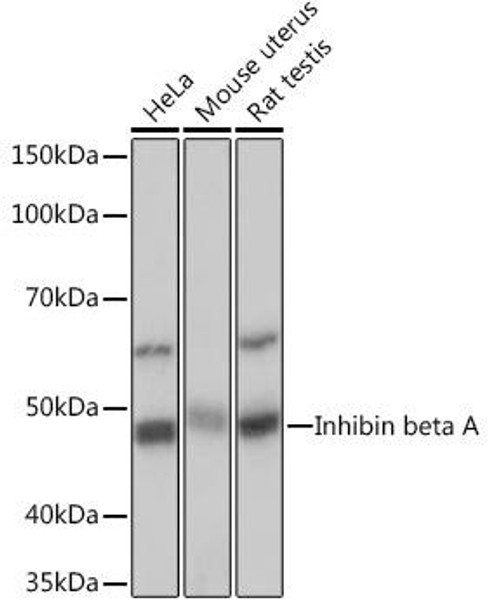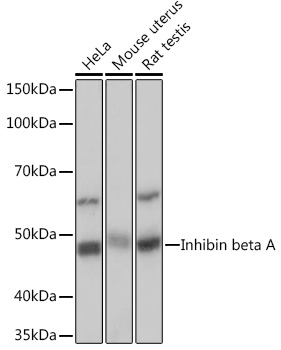Anti-Inhibin beta A Antibody (CAB5232)
- SKU:
- CAB5232
- Product type:
- Antibody
- Reactivity:
- Human
- Mouse
- Rat
- Host Species:
- Rabbit
- Isotype:
- IgG
- Research Area:
- Cell Biology
Description
| Antibody Name: | Anti-Inhibin beta A Antibody |
| Antibody SKU: | CAB5232 |
| Antibody Size: | 20uL, 50uL, 100uL |
| Application: | WB IF |
| Reactivity: | Human, Mouse, Rat |
| Host Species: | Rabbit |
| Immunogen: | A synthesized peptide derived from human Inhibin beta A |
| Application: | WB IF |
| Recommended Dilution: | WB 1:500 - 1:2000 IF 1:50 - 1:200 |
| Reactivity: | Human, Mouse, Rat |
| Positive Samples: | HeLa, Mouse uterus, Rat testis |
| Immunogen: | A synthesized peptide derived from human Inhibin beta A |
| Purification Method: | Affinity purification |
| Storage Buffer: | Store at -20°C. Avoid freeze / thaw cycles. Buffer: PBS with 0.02% sodium azide, 0.05% BSA, 50% glycerol, pH7.3. |
| Isotype: | IgG |
| Sequence: | Email for sequence |
| Gene ID: | 3624 |
| Uniprot: | P08476 |
| Cellular Location: | |
| Calculated MW: | 43kDa |
| Observed MW: | 47KDa |
| Synonyms: | EDF, FRP |
| Background: | This gene encodes a member of the TGF-beta (transforming growth factor-beta) superfamily of proteins. The encoded preproprotein is proteolytically processed to generate a subunit of the dimeric activin and inhibin protein complexes. These complexes activate and inhibit, respectively, follicle stimulating hormone secretion from the pituitary gland. The encoded protein also plays a role in eye, tooth and testis development. Elevated expression of this gene may be associated with cancer cachexia in human patients. [provided by RefSeq, Aug 2016] |
| UniProt Protein Function: | INHBA: Inhibins and activins inhibit and activate, respectively, the secretion of follitropin by the pituitary gland. Inhibins/activins are involved in regulating a number of diverse functions such as hypothalamic and pituitary hormone secretion, gonadal hormone secretion, germ cell development and maturation, erythroid differentiation, insulin secretion, nerve cell survival, embryonic axial development or bone growth, depending on their subunit composition. Inhibins appear to oppose the functions of activins. Belongs to the TGF-beta family. |
| UniProt Protein Details: | Protein type:Secreted; Secreted, signal peptide Chromosomal Location of Human Ortholog: 7p14.1 Cellular Component: extracellular region Molecular Function:cytokine activity; growth factor activity; hormone activity; identical protein binding; peptide hormone binding; protein binding; transforming growth factor beta receptor binding Biological Process: activin receptor signaling pathway; cell cycle arrest; cell development; cell differentiation; cell surface receptor linked signal transduction; cell-cell signaling; defense response; G1/S transition of mitotic cell cycle; hair follicle development; hemoglobin biosynthetic process; hemopoietic progenitor cell differentiation; male gonad development; negative regulation of B cell differentiation; negative regulation of cell cycle; negative regulation of cell growth; negative regulation of cell proliferation; negative regulation of interferon-gamma biosynthetic process; negative regulation of macrophage differentiation; negative regulation of phosphorylation; odontogenesis; ovarian follicle development; palate development; positive regulation of cellular protein metabolic process; positive regulation of erythrocyte differentiation; positive regulation of follicle-stimulating hormone secretion; positive regulation of transcription from RNA polymerase II promoter; positive regulation of transcription, DNA-dependent; progesterone secretion; regulation of follicle-stimulating hormone secretion; regulation of MAPKKK cascade; regulation of transcription from RNA polymerase II promoter; response to drug; striatal medium spiny neuron differentiation |
| NCBI Summary: | This gene encodes a member of the TGF-beta (transforming growth factor-beta) superfamily of proteins. The encoded preproprotein is proteolytically processed to generate a subunit of the dimeric activin and inhibin protein complexes. These complexes activate and inhibit, respectively, follicle stimulating hormone secretion from the pituitary gland. The encoded protein also plays a role in eye, tooth and testis development. Elevated expression of this gene may be associated with cancer cachexia in human patients. [provided by RefSeq, Aug 2016] |
| UniProt Code: | P08476 |
| NCBI GenInfo Identifier: | 124279 |
| NCBI Gene ID: | 3624 |
| NCBI Accession: | P08476.2 |
| UniProt Secondary Accession: | P08476,Q14599, |
| UniProt Related Accession: | P08476 |
| Molecular Weight: | 47,442 Da |
| NCBI Full Name: | Inhibin beta A chain |
| NCBI Synonym Full Names: | inhibin beta A subunit |
| NCBI Official Symbol: | INHBA |
| NCBI Official Synonym Symbols: | EDF; FRP |
| NCBI Protein Information: | inhibin beta A chain |
| UniProt Protein Name: | Inhibin beta A chain |
| UniProt Synonym Protein Names: | Activin beta-A chain; Erythroid differentiation protein; EDF |
| Protein Family: | Inhibin |
| UniProt Gene Name: | INHBA |









